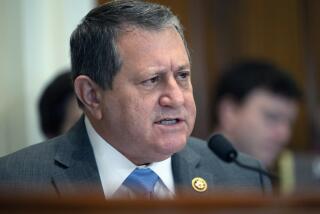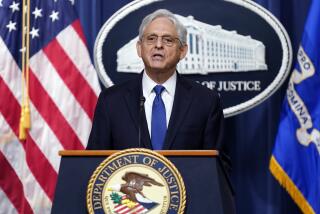Democrat Plans to Ask Senate to Censure Bush
- Share via
WASHINGTON — Sen. Russell D. Feingold (D-Wis.) said Sunday that he would ask the Senate to censure President Bush for authorizing a warrantless domestic spying program, signaling a new determination by Democrats to keep the heat on the White House over the controversial eavesdropping by the National Security Agency.
Although the surveillance program has drawn criticism from Republicans as well, a Senate GOP leader dismissed the move by Feingold, a liberal iconoclast and possible 2008 presidential candidate, as “political grandstanding.”
Announcing plans to introduce a censure resolution today, Feingold said, “The president must be held accountable for authorizing a program that clearly violates the law and then misleading the country about its existence and its legality.”
He and other critics of the surveillance have accused the administration of violating a 1978 law that requires court approval for the National Security Agency to eavesdrop on people in the United States.
The White House did not respond to Feingold’s declaration. Senate Majority Leader Bill Frist (R-Tenn.) called it “a crazy political move,” suggesting the resolution was unlikely to go anywhere in the Republican-controlled Senate.
“The signal that it sends -- that there is in any way a lack of support for our commander in chief who is leading us with a bold vision in a way that we know is making our homeland safer -- is wrong,” Frist said on ABC’s “This Week.”
Senate Armed Services Committee Chairman John W. Warner (R-Va.) said on CNN’s “Late Edition” that Feingold was engaging in “political grandstanding.”
Censure, which the Senate describes as “a formal statement of disapproval,” carries no legal penalty.
A president has been censured only once, in 1834 -- when the Senate, controlled by members of the Whig Party, censured Democratic President Andrew Jackson for seeking to withdraw deposits from the privately run Bank of the United States. Jackson, who two years earlier had vetoed a reauthorization of the bank’s charter, rejected the resolution as illegal and unconstitutional. By 1837, the Democrats had regained control of the Senate and voted to expunge the censure.
Feingold, appearing on ABC’s “This Week,” defended his move. “We as a Congress have to stand up to a president who acts as if the Bill of Rights and the Constitution were repealed on Sept. 11,” he said.
The administration has said Bush’s authority to permit the warrantless eavesdropping comes from his constitutional power as commander in chief and from the congressional resolution that authorized him to use all necessary force after the Sept. 11 terrorist attacks.
Feingold said in a statement that there was “no language in the resolution and no evidence to suggest that it was intended to give the president authority to order these warrantless wiretaps. Warrantless domestic surveillance is not an ‘incident of war’ akin to detaining an enemy soldier on the battlefield, as the administration has argued.”
The censure resolution is Feingold’s latest effort to take on Bush. He was the first Democratic senator to endorse a timeline for withdrawing all U.S. troops from Iraq, and he led the fight against renewing the Patriot Act, contending that it infringed on civil liberties.
Some of his Democratic colleagues were taking a more cautious approach. The top Democrat on the Senate Armed Services Committee, Carl Levin of Michigan, told CNN’s “Late Edition” that he thought Bush was wrong to authorize the spying without court approval but wanted to “wait until the investigation is completed.”
More to Read
Sign up for Essential California
The most important California stories and recommendations in your inbox every morning.
You may occasionally receive promotional content from the Los Angeles Times.











